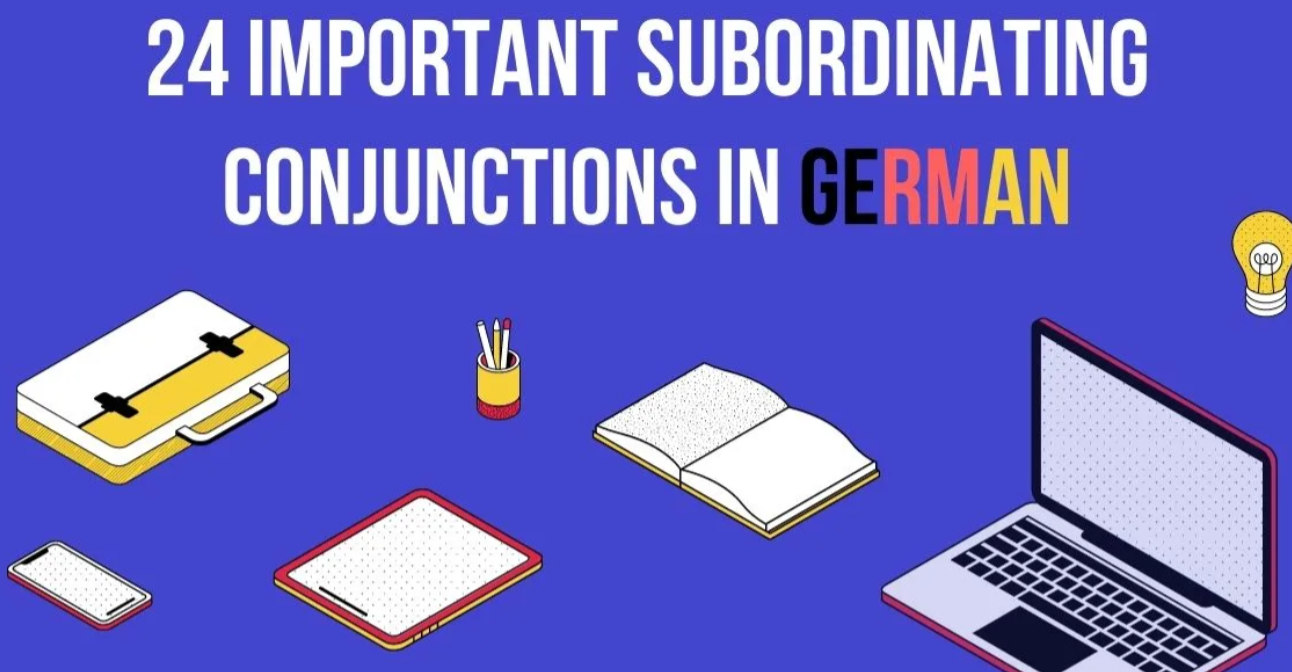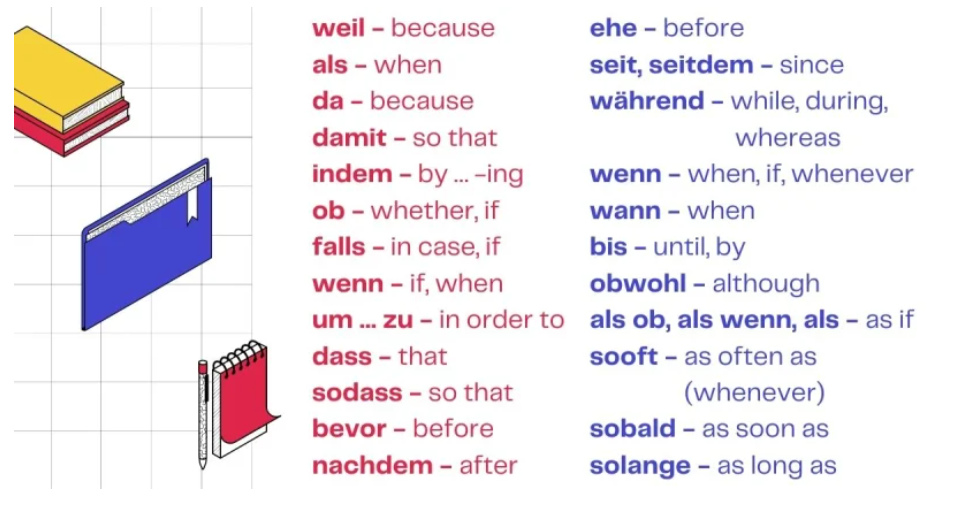
What are German subordinate conjunctions, and why should you pay special attention to them when learning German?
Conjunctions are a vital part of grammar in many languages, including German. They are used to bind together different parts of complex and compound sentences – for example, the main clause and the subordinate clause in a complex sentence. In many cases, this can affect the word order, so you need to know how exactly to use different conjunctions in different situations.
When it comes to the German complex sentences, they consist of two clauses. A subject and verb make up an independent (or main) clause that can stans alone as a sentence. A subordinate (or dependent) clause also has a subject and verb, but it cannot stand alone because it needs the information given in the main clause. German subordinating conjunctions are used to put together main and subordinate clauses so that the sentence sounds as natural as possible.
In the article above, you can find all the information you need about the German subordinating constructions and German sentence structure rules that apply to complex sentences. Read on and boost your knowledge of German grammar.
Conjunctions in the German Language
In the German language, there are two types of conjunctions: coordinating conjunctions and subordinating conjunctions. Coordinating conjunctions are used to join two verbs, two nouns, two adjectives, two phrases, or two independent clauses – for example, in a compound sentence. On the other hand, German subordinating conjunctions link the dependent clause (subordinate clause) to the independent clause.
Subordinating conjunctions affect the sentence structure by changing the position of the verb, while coordinating conjunctions leave the position of the verb unchanged. Today we want to concentrate on the most common subordinating conjunctions in German as they change the normal word order in a sentence, which can impact the way you speak or write.

German Subordinating Conjunctions: the Basics
Subordinate clauses and, therefore, subordinating conjunctions change the word order in a sentence.
When a sentence starts with a subordinating conjunction, the main clause begins with the conjugated verb. This happens because, according to the German word order, the verb must stand in the second position in the sentence at all times. Here, the subordinate clause stands in the first position, so the verb of the main clause must go right after it.
Native
Translation
Weil ich krank bin, bleibe ich zu Hause.
Since I am sick, I’m staying home.
Weil (because, since) is the subordinating conjunction, and bleibe (to stay) must start the main clause.
On the other hand, when the sentence ends with a subordinate clause, you should send the verb in it to the end of the sentence.
Native
Translation
Ich bleibe zu Hause, weil ich krank bin.
I’m staying home because I am sick
Weil (because) is the subordinating conjunction, and bin (I am) must go to the end.
Most Common Subordinate Conjunctions in the German Language
We want to help you spot German subordinating conjunctions when you come across them – you can do that based on the rules above. In clauses introduced by subordinating conjunctions, the conjugated verb is forced to move to the end of the clause (not the sentence), and a comma is placed before the conjunction.
However, this tip might be a little tricky sometimes, so it’s best to simply memorize German subordinate conjunctions. Here’s a picture that should help:

Here’s a list of the 24 most important German subordinating conjunctions you will need to remember:
- weil – because
- als – when (in describing past events)
- da – because
- damit – so that
- indem – by … -ing
- ob – whether*, if (*only use when you could say “whether” in English as well)
- falls – in case, if
- wenn – if, when
- um … zu – in order to
- dass – that
- sodass – so that
- bevor – before
- nachdem – after
- ehe – before
- seit, seitdem – since (indicating time, not a causality)
- während – while, during, whereas
- wenn – when (describing present and future), if, whenever
- wann – when (for questions only)
- bis – until, by
- obwohl – although
- als ob, als wenn, als – as if
- sooft – as often as (whenever)
- sobald – as soon as
- solange – as long as
Using The Subordinate Conjunction In German
To separate the subordinating conjunctions from the main clause, you should always use a comma to distinguish between the clauses.
To create a complex sentence, remember to:
- join the sentences with the conjunction
- send the verb to the end
For example:
Native
Translation
Sie ist mit dem Bus gekommen, weil ein Taxi zu teuer ist.
She came by bus because a taxi is too expensive.
Main clause: Sie ist mit dem Bus gekommen.
Subordinate clause: weil ein Taxi zu teuer ist.
Let’s Practice
Here are a few more examples of the sentences with subordinate clauses and subordinate conjunctions:
- Main clause: Es schneite.
- Subordinate clause: Ich kam in Berlin an.
Native
Translation
Es schneite, als ich in Berlin ankam.
It was snowing when I arrived in Berlin.
Subordinate clause: Du warst nicht zu Hause.
Main clause: Das Paket wurde beim Nachbarn abgegeben
Da du nicht Zuhause warst, wurde das Paket beim Nachbarn abgegeben. (Since you weren’t at home, the package was handed over to the neighbor).
- Main clause: Ich esse viel Gemüse.
- Subordinate clause: Ich bleibe Gesund.
Native
Translation
Ich esse viel Gemüse, damit ich Gesund bleibe.
I eat a lot of vegetables so that I stay healthy.
Please note:
If there is a separable prefix verb in a dependent clause, the prefix remains attached to the verb, and the entire verb goes to the end of the clause, whereas normally, the prefix would go to the end.
Native
Translation
Er ist immer schlecht gelaunt, wenn er hunger hat.
He is always moody when he gets hungry.
Let’s Summarize

- A conjunction is a word or a phrase used to connect two clauses. Their purpose is to show the relationship between the clauses.
- Subordinating conjunctions in German join the subordinate clause and the main clause into one complex sentence.
- A subordinate clause cannot stand alone as a complete sentence.
- The word order usually changes when two clauses come together. Subordinating conjunctions in German change the verb’s location in the sentence; the verb is pushed to the end of the sentence.
Subordinating conjunctions – this grammar topic is the one that you need to learn to become fluent in German. Both your speaking and writing will depend on it!
We know that it can seem a bit too much at first, but don’t worry – you will get there. Make sure to learn the subordinating conjunctions we’ve listed above, and your language learning process should become a little quicker and easier.
Challenge Yourself
Learning the German language with all its grammar rules and parts like conjunctions, conjugated verbs, dependent clauses, and so on can be a lot to deal with until it makes sense. So don’t stress if you can’t understand them in an instant. German grammar is something that even Germans struggle with sometimes!
On a good note, there is a little tool that might improve your German skills in no time. As soon as you feel ready to tackle difficult topics in German, you can test your knowledge with the Readle App – learn German. There, you can practice reading, listening, and understanding, learn new vocabulary and expressions, master grammar, and get entertained by an engaging quiz after each short story. Do you want to learn more about subordinate conjunctions in German? Then check it out today.
